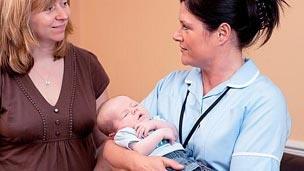Midwife shortages in England 'risking lives'
- Published

Midwives say shortages could harm patients
Parts of England are facing big midwife shortages, putting mothers and babies at risk, midwives have said.
The Royal College of Midwives says a 22% rise in births over 20 years has led to shortfalls across England, but some areas are worse than others - it highlights the East Midlands and East.
The RCM wants 4,700 more midwives and says the prime minister has backed away from a pledge to raise numbers.
The Department of Health said record numbers of midwives were being trained.
Midwives say births are becoming increasingly complex because of growing numbers of obese and older mothers-to-be, who often need extra support.
The Royal College of Midwives says the extra 4,700 midwives are needed across England to keep pace with the added pressures.
And it says a new analysis of midwife numbers across England reveals big variations - with limited shortages in some areas and serious shortfalls in others.
The calculations were done by measuring the number of midwives in an area against the number of babies born there. The RCM estimates that one midwife is needed for every 28 hospital births and 35 births in a midwife-led unit or at home.
The North East and North West of England had a shortfall of less than 10%.
But according to the figures, the East Midlands and East of England need 41% more midwives, and the South East is also more than a third short of staff.
The college says the disparity is down to different levels of investment in different areas; women living in places with bigger shortfalls are at risk of having less choice over how and where they give birth.
It says Scotland, Wales and Northern Ireland do not have midwife shortages at the moment.
'Critical shortfalls'
The Royal College of Midwives' Cathy Warwick says the government must re-think the number of midwives
"This is a real problem in England," said Cathy Warwick, RCM General Secretary.
"We believe women should have the same choice over giving birth wherever they live. Once you get to really critical shortfalls, maternity services won't be safe."
It's a sentiment echoed by the head of midwifery at Wansbeck hospital in Northumberland, where they say they have enough staff to offer high-quality care.
Janice McNichol has delivered more than 1,000 babies in her career, and prides herself on making sure every mother has a positive experience.
"It's about safety and quality of care," she said. "Making sure midwives are there when mum needs them, to answer questions and help her through the process."
The charity Action against Medical Accidents, AVMA, said the situation in some areas was desperate.
"Having a baby should be the happiest time in a couple's life, but failure to deal with this problem is all too often turning it into a tragedy," said AVMA chief executive Pater Walsh.
"Maternity services should be the NHS's first priority for improving patient safety and having enough trained midwives is an absolute must."
The Department of Health said midwife numbers had risen and record numbers are being trained.
A spokesperson said all mothers and their babies should expect and receive consistently excellent maternity care.
- Published10 August 2011
- Published25 July 2011
- Published14 July 2011
- Published6 March 2011
- Published16 November 2010